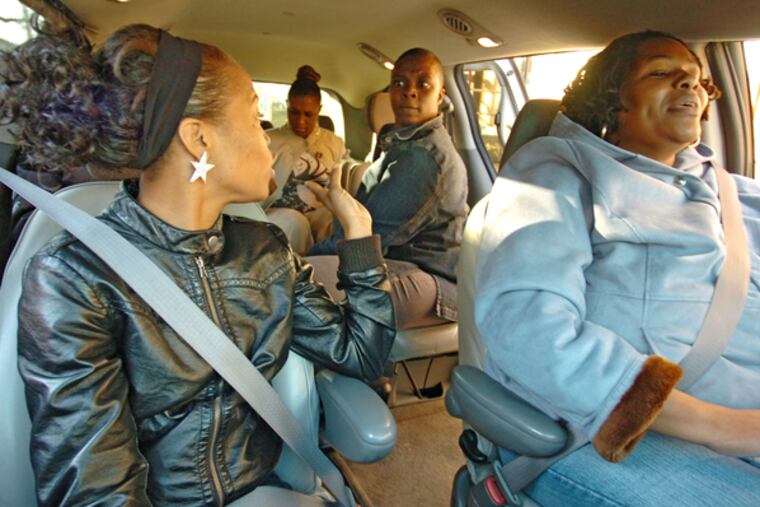Getting city residents to jobs in the suburbs
Seneca Crawley hopped out of the minivan and knocked on Tiffany Clark's door on Berks Street in North Philadelphia. Time was flying by, and the last thing Crawley, a former welfare recipient, wanted was to be late for her new telemarketing job in Glassboro.

Seneca Crawley hopped out of the minivan and knocked on Tiffany Clark's door on Berks Street in North Philadelphia.
Time was flying by, and the last thing Crawley, a former welfare recipient, wanted was to be late for her new telemarketing job in Glassboro.
"That's my motivator," driver Christine Carey, 39, said with a laugh.
Clark jumped in and opened her makeup bag as Carey pulled away from the curb.
At a time when the economy is shedding jobs at a record rate, Carey, Crawley and Clark
can
work because they can
get
to work.
For many unemployed, particularly city residents, commuting to work in the suburbs, where there are more jobs, poses a challenge.
The women are part of a nearly three-year-old program run by the Philadelphia Unemployment Project.
Drivers get personal use of the van for 200 miles a month in return for taking coworkers to work. The project pays for the van, insurance, maintenance and gasoline.
"This van lifts a lot of burdens for my family," Carey said.
Number one might be the burden of unemployment.
On Friday, the U.S. Labor Department reported that the nation shed 533,000 jobs - the largest number of jobs lost in a single month since December 1974.
Particularly hit hard are African Americans like Carey, Crawley, Clark and the two other women in the van.
Unemployment among African Americans rose to 11.2 percent in November, up from 8.4 percent a year ago. That compares with 6.7 percent nationally, up from 4.7 percent in November 2007.
"There is a labor shortage in the suburbs and a labor surplus in the city," said John Dodds, director of the Philadelphia Unemployment Project, a Center City advocacy group for the unemployed. "They can get out to the suburbs and do a little better."
SEPTA, he said, does not have the funds to run as robust a reverse-commute program as is needed.
The van project "is very inexpensive as a transit program because we don't have paid drivers," Dodds said.
The program launched in March 2006 with a handful of leased vans and $1.4 million in federal funding matched by funds from Pennsylvania's Department of Labor and Industry, the state Welfare Department, and some employers, who pay $2,000 per year per van.
Since then, U.S. Rep. Chaka Fattah, a Democrat from Philadelphia, has helped secure an additional $900,000 in federal funding, now caught up in the appropriation process, Dodds said. Meanwhile, there is still nearly $600,000 from the original grants.
Working all shifts, 130 riders in 29 vans now travel to suburban employers. About 500, who pay $25 a week, have participated in the program since it began, coordinator Len Lebowitz estimated.
But the economy has taken its toll. Sometimes drivers are laid off, so Lebowitz must reconfigure routes so everyone can get to work.
After 19 months on the job, Tawanda Edwards, 23, of Strawberry Mansion, had to miss work last month at the Rite Aid Corp. warehouse in Fairless Hills when her van's driver was laid off. "It was really stressful," she said.
David Quindlen, Rite Aid's human resources manager at the facility, says the program has worked well. Because of the van, Edwards has been able to recruit family friends to work at Rite Aid.
Other challenges include finding enough city residents with valid drivers' licenses.
At times, Lebowitz said, it is a problem with the employer. Conditions were so harsh at a suburban meatpacking plant that workers quit in days. Eventually, the unemployment project declined to send any workers there.
The project can help employers find workers. "Most of the time we're looking for people," said Tina Casalnova, the main recruiter for the 90-seat call center in Glassboro where Carey works. For city employees, "transportation seems to be the major problem," Casalnova said.
New Jersey Transit does run a bus to Glassboro, but it is expensive, long and inconvenient, especially when their normal shifts end at 10 p.m., said Carey, who lives in Philadelphia's Logan section.
Carey's glad to have the job. She went on welfare after being laid off in June 2006. "My unemployment ran out," she said. "It was tough times."